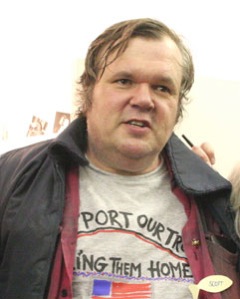Fabián Casas y Viggo Mortensen
FABIÁN:
Hola Cuervo, estamos ya en Reñaca, Chile. Soy un Kerouac que cometió el error fatal de reproducirse. Vamos en el auto los cuatro más miles de bolsos. Hicimos 12 horas de manejo hasta Mendoza, cruzamos la cordillera -una belleza impresionante- y nos quedamos en Santiago tres días porque salió un librito nuevo mío ahí y lo pasé a buscar. Ahora pasamos las fiestas y vamos por las carreteras chilenas hasta el sur, a Valdivia, para cruzar de nuevo a Argentina y quedarnos en La Angostura. Tengo la mitad de la novela de Dinesen que escribí para terminarla y entregarla a la editorial. ¿Dónde estás? Antes de irme estuve con Lammens, nos abrazamos y lloramos juntos de emoción por la vuelta a Boedo.
P.D.: Mirá la foto que me mandó mi agente española:
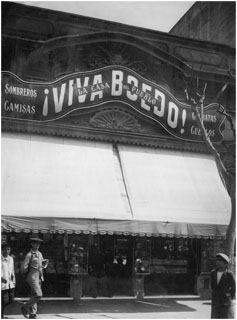
——————-
VIGGO:
¡Genial esta foto! ¿Es el nombre de la tienda, o hay un pueblo que se llama Boedo? En España hay un pueblo que se llama Almagro, donde se hace teatro clásico cada verano. Obras de Lope de Vega, Calderón de la Barca, Cervantes, Shakespeare, Tirso de Molina, etcétera. Vienen algunas compañías de otros países a presentar sus versiones de estas obras para complementar las de compañías españolas. El pasado julio, por ejemplo, vino la compañía de Tim Robbins (The Actor’s Gang) de EE.UU., dos grupos argentinos, y otros de Chile, México, la República de Corea, y Grecia. Es un sitio hermoso. También hay un centro de jardinería bastante grande en Madrid que se llama Casla. De eso hablamos en otra columna. Pero ¿Boedo? Voy a investigar eso. Espero que sigan sin problemas en el viaje a lo largo de la cordillera. Ya casi están de vuelta en Argentina, entonces. Uno de los regalos de Navidad que recibí la semana pasada fue un librito que se llama Sobre el deporte, que reúne escritos del iconoclasta director de cine Pier Paolo Pasolini sobre el fútbol, el boxeo, el ciclismo y los Juegos Olímpicos. Hay una entrevista muy corta que le hace a jugadores del equipo de sus amores, el Bologna F.C., sobre las inhibiciones sexuales o falta de ellas que puedan tener esos jóvenes futbolistas, encontrando la manera de relacionar sus preguntas insinuantes a su forma de jugar al fútbol y de sentirse en la cancha. La entrevista es una pequeña parte de un documental “Comizi d’amore”, filmado en 1963.
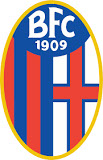
Los jugadores parecen estar muy poco inhibidos a la hora de hablar del sexo o de practicarlo. Supongo que las preguntas no eran tan difíciles, y que les dejaban hacerse los gallos conquistadores a estos futbolistas. Las dos excepciones son Negri y Bulgarelli. El primero dice que no le importa el tema del amor o el sexo a la hora de jugar, que no piensa para nada en esas cosas. Bulgarelli, que parece ser un tipo más o menos intelectual, dice que el catecismo hace que todos sientan cierta represión. No sé si los jugadores conocían el cine de Pasolini o algo de las predilecciones sexuales del legendario director. En otros escritos de este libro él compara de manera interesante la literatura italiana con el periodismo deportivo de ese país. Lo cierto es que era un hincha apasionado del Bologna, y que le encantaba jugar al fútbol. La tapa del libro tiene una linda foto de Pasolini en un partido amistoso. Y tiene los colores del BFC, que son los nuestros:
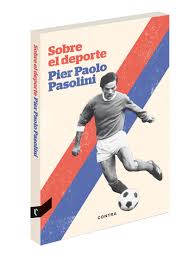
En un artículo que fue publicado en 1971, habla de las diferencias generales entre el fútbol europeo y el de Sudamérica. Ahí dice que lo que pasó en México (el Mundial de 1970) es que “la prosa estetizante italiana perdió ante la poesía brasileña”. Suena sencillo eso, pero él explica con bastante claridad, incluso con ilustraciones esquemáticas, lo que significan para él estas diferencias. Lo que pasó en el siguiente Mundial, el que se jugó en Alemania en 1974, fue que los holandeses combinaron las dos cosas que describe Pasolini -el juego colectivo partiendo de atrás con el fútbol individual de toque y ataque. El fútbol total de la Naranja Mecánica, dirigida por Rinus Michels, de la que tanto hemos hablado en esta columna.

Ahora averigüé que hay dos localidades en España que incluyen el nombre Boedo: el pueblo Boedo de Castrejón y la comarca Boedo-Ojeda. ¿Quizá la tienda en la vieja foto que me enviaste se encontraba en uno de esos lugares? ¿O es de nuestro Boedo de Buenos Aires? Suponía que si tu agente en España te enviaba la foto era porque venía de acá.
Hablando de España, en este país hay olivos que tienen mil años y siguen dando fruta. Como no parecen tener protección alguna por su valor histórico, hay quienes los compran, los desentierran y los transportan enteros al extranjero. Muchos de estos árboles antiguos mueren en el viaje a Asia, Europa o a las Américas, y los que llegan tienen una esperanza de vida mucho menor de la que hubieran tenido si no los hubieran arrancado de su tierra natal. Hoy leí este artículo detallado y algo desalentador al respecto:
http://www.theguardian.com/world/2015/dec/31/spain-ancient-olive-trees-threat-garden-ornaments

Otra cosa interesante -y algo graciosa- que leí en la página de Mundo Azulgrana sobre la planificación del próximo torneo argentino:
——————-
FABIÁN:
Hola Viggo,
Te escribo con Julián sentado en mis piernas, tocando todo. Estamos ya en La Angostura después de cruzar Chile de norte a sur y parar unos días en Valdivia. Ahora nos vamos a quedar acá por diez días, lo cual es bueno porque no estuve en ningún lugar más de tres días seguidos y todo con la maldita y bella familia que me da momentos hermosos y momentos en los que los quiero matar a todos. ¿Viste esa escena de “Reservoir Dogs” cuando todos los gángsters se apuntan y disparan a la vez y caen todos muertos?
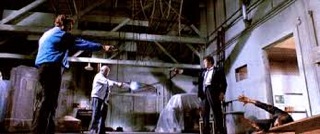
Bueno, eso pasa a veces cuando todos nos peleamos entre nosotros, incluyendo al bebé Julián. Pero manejé en ripios por la cordillera y encontré un libro que venía buscando hace mucho de Gichin Funakoshi, el maestro okinawense que logró unificar los golpes del karate, y lo compré y no paré de leerlo con profunda emoción. Estaba en una librería al lado de la casa que nos prestaron en Santiago de Chile. Cuando vuelva no veo la hora de retomar el karate que dejé un año entero. Viajar, pienso, es una forma de vivir la impermanencia; estás en un lado, y al rato estás en otro, y después otro. Como dice Funakoshi, en el mundo nada muere, todo vuelve hacia los elementos esenciales, ¡salvo que está la vanidad del hombre deteniendo el proceso!
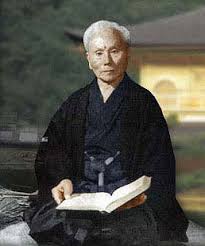
——————-
VIGGO:
Che, Cuervo, ¿conocés la película “Network” (en Argentina se llama “Poder que mata” y en España “Un mundo implacable” – muy malas versiones del título en mi opinión), de 1976? Fue escrita por el gran guionista Paddy Chayevsky y dirigida por Sidney Lumet. El reparto de actores, que incluye a Peter Finch, William Holden, Robert Duvall y Faye Dunaway, es tremendo. Es una película que sigue siendo asombrosa, atrevida, y elocuente hasta el día de hoy en su manera de apuntar a la vacuidad y el cinismo de los medios tanto como a la pasividad y conformismo irreflexivo del espectador. La volví a ver ayer por primera vez en veinte años, y pensé “no cambió nada; la gran mayoría de la gente sigue dejándose adoctrinar, participando en una especie de autolavado de cerebro a través de la tele y sus cachivaches”. Las calles de todas las ciudades y todos los pueblos del mundo parecen estar pobladas por zombies que pasan casi todas las horas de sus días mirando las pantallitas de sus teléfonos, apartándose cada vez más del presente, del ambiente inmediato que atraviesan, ciegos y sordos a los detalles irrepetibles de sus vidas. Los seres humanos están aprendiendo a informarse y a comunicar todo lo que ven, piensan y sienten a velocidades que hace poco eran impensables, pero me parece que cada vez están menos “acá”, cada vez participan menos en sus propias vidas. De eso se trata “Network”. Si no la viste te la recomiendo.

Hay una canción que se llama “All The Lonely People”, de la banda America, de la misma época de “Network”, que me trae en mente la gente que se atreve, como lo hace el personaje de Peter Finch en la peli, a preguntarse “¿Dónde estoy, en realidad, qué está pasando acá, ahora mismo, quién manda, porque obedezco y qué pasa si digo, después de entender lo que me pide mi vida y mi cuerpo, que no voy a obedecer?”. Una canción que, a pesar de ser algo sosa, habla de la esperanza que te trae empezar de cero, que trae poder decir “¡presente!”. Te paso una grabación, creo que es de 1973:

——————-
FABIÁN:
Hola Cuervo: no, no vi la peli que contás, la agendé para buscarla y verla. Acabamos de llegar ayer de los 25 días on the road por Chile y Argentina. Tardamos dos días largos en auto desde el sur, La Angostura, parando en Santa Rosa de La Pampa y llegando a Buenos Aires a las siete de la tarde. Fue un viaje inolvidable que reivindica la inestabilidad de las familias, como en esa gloriosa película llamada “Little Miss Sunshine”.

La familia es eso: algo disfuncional y esencial. Ahora, Cuervo, acá tengo un pela de fedex que me dice que lo que me mandaste está capturado en la aduana de Ezeiza porque infringe una ley textil del orto. No lo puedo creer. Para recapturarlo tengo que ir a una oficina que no sé dónde está para hacer un trámite y después ir a Ezeiza y pagar 100 dólares más gastos si es que todavía está el paquete ahí. Tenemos mala suerte con los envíos vos y yo. Lo que sí me llega genial son tus postales hermosas. Acá preocupados porque perdimos el primer Clásico del año con Huracán, aunque mi hermano me dijo que en el primer tiempo pudimos meter varios goles. ¿Lo viste? Yo estaba en una cabaña en el bosque sin wifi ni tele ni nada. Abrazos, Cuervo.
——————-
VIGGO:
Sí, vi la segunda mitad. No sé qué hicimos en la primera, pero en la segunda San Lorenzo jugó como el orto. ¡Qué putada lo de aduanas en Ezeiza! Dejalo nomás. Que me lo devuelvan y te lo doy cuando te vea, como pasó con los regalos de Navidad el año pasado. El textil “ilegal” que te mandaba es una remera del CASLA de los ’90 y una bolsa hecha a mano con el escudo de San Lorenzo. ¿Ahora es ilegal en Argentina el Ciclón? Sería un agente de aduanas Bostero o Quemero, ¿no? Increíble.
——————-
FABIÁN:
Anoche después de bañar a Julián y darle de comer y dormirlo, puse la tele para ver el partido de verano entre el CASLA y River. El primer tiempo me gustó como jugamos y el segundo fue una desbandada. Me gustó que Guede pueda probar a los chicos, que hiciera jugar a San Lorenzo de manera ofensiva (parece más ofensivo que Pizzi) pero todavía es, como se dice, “amores de estudiantes, flores de un verano son”. Hay que esperar. Cuando River nos metió el tercer gol apagué la tele y me puse a leer los diarios de Tarkovsky que son geniales. ¿Los leíste? A la noche soñé con vos, creo que estábamos en Boedo hablando sobre cómo habíamos jugado un partido, y de golpe, con esos pliegues que tienen los sueños, me daba cuenta que era el post-partido después de haber ganado la segunda Libertadores. ¡¡¡Genial!!! Vos decías: “¡Ortigoza la rompió!”.

——————-
VIGGO:
Lindo sueño, hermano. ¡Que se dé!
Tarkovsky escribía muy bien, tan bien como dirigía sus películas. Conozco sus diarios, y sus libros de fotos. Tengo uno buenísimo con polaroides vinculados a sus rodajes. El libro suyo que más me gusta -y uno de los mejores libros que tengo sobre el cine- se llama Esculpir en el tiempo.
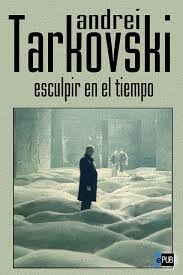
El otro día leí en el diario local (ahora estoy de vuelta en el nordeste de los EE.UU. para acompañar a mi viejo a varias citas médicas, y para aprovechar el tiempo que nos queda para entendernos cara a cara) un relato increíble sobre un tipo en Noruega que oye al amanecer por la ventana de su dormitorio que le están robando el auto. Sale en calzoncillos y se tira encima del auto cuando este arranca por el camino nevado. El ladrón sigue manejando a lo loco y va a 90 km/h durante varios kilómetros por una carretera helada, hasta que el dueño rompe la ventana trasera con su rodilla y entra al auto a darle trompadas como si fuera una película de acción. Finalmente chocan contra una barrera. Llegan los policías y arrestan al ladrón. Sangre y nieve por todos lados. El dueño es un superhéroe vikingo. Acá la noticia contada por la BBC:
http://www.bbc.com/news/world-europe-35371093?utm_source=fark&utm_medium=website&utm_content=link
Nuestro compañero de viajes absurdos ha ganado otro premio. A “Jauja” la nombraron “Best Latin American Film of the year” el jurado de la sexta edición de los Cinema Tropical Awards, los únicos premios estadounidenses que celebran el cine latinoamericano. La ceremonia fue en Nueva York. ¡Felicitaciones Lisandro!
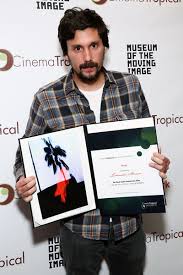
La lista completa de los ganadores:
Best Latin American Film of the Year – Jauja (Argentina)
Best Documentary Film – Invasión (Panamá)
Best First Film – Ixcanul Volcano (Guatemala)
Best U.S. Latino Film – Mala Mala
Best Director of a Feature Film – Pablo Larraín, for The Club (Chile)
Best Director of a Documentary Film – Betzabé García, for Kings of Nowhere (México)
Va creciendo nuestra Nina. Ya tiene cuatro meses:

Aunque ya es vieja noticia (hace un mes que ocurrió), menciono la vergonzosa manera de despedir a Rafael Benítez del Real Madrid porque me parece que los clubes grandes se portan cada vez peor en todos lados, y que la gente acepta casi sin parpadear el comportamiento irrespetuoso de avaros impresentables como el presidente Florentino Perez del Madrid. Esta vez lo hizo muy mal Florentino, incluso peor que lo había hecho con Ancelotti, Casillas, Pellegrini, Raúl, o Vicente del Bosque en sus lamentables momentos de partida. Ha incorporado a Zidane como nuevo D.T., y a la leyenda franco-argelina le va más o menos bien la cosa hasta ahora. Quiero que triunfe Zidane como entrenador, pero lo de Benítez no está bien. Esto salió en El País sobre el pésimo desenlace de la destitución:
El Real Florentino
“Hemos tomado una difícil decisión, como es resolver el contrato de Rafael Benítez del primer equipo. Estamos ante un magnífico profesional y una gran persona. Quiero agradecerle su trabajo estos meses. La Junta Directiva ha decidido nombrar entrenador del primer equipo a Zidane”. Así, en apenas 22 segundos, despachó Florentino Pérez la etapa de Benítez como entrenador blanco.

Pero el trato hacia el madrileño va más allá, ya que a Benítez, en el momento en el que se estaban pronunciando estas palabras, todavía no le habían comunicado oficialmente que dejaba de ser técnico del Madrid. De hecho, durante la misma tarde de ayer le habían dicho que la decisión no estaba tomada, pero que se pasara por el Bernabéu. Algo que no quiso hacer para evitar que le hicieran la foto entrando en el estadio. De hecho, ni siquiera fue su agente, Manolo García Quilón. Conciencia tranquila. El entrenador, que cobrará seis meses más de su contrato, se mostró sorprendido cuando se enteró de que estaba allí la familia de Zidane. “Una más de las que me han hecho”, comentó resignado a su entorno, el cual asegura que se va con la conciencia tranquila. Repite, además, que el club le ha pedido que hiciera lo que ellos no se han atrevido a hacer… como castigar a James o Jesé. “Imposible trabajar así”, contó a sus íntimos.
(http://deportes.elpais.com/deportes/2016/01/04/actualidad/1451939924_949743.html)
Benítez, en cambio, mostró que es un hombre honrado al despedirse del club y de la afición madridista por escrito (ya que Florentino no le dio la oportunidad de hacerlo en persona, de manera decente):
“Quiero que todos los que forman esa entidad, desde su junta directiva al último de sus aficionados, pasando por dirigentes, trabajadores, seguidores y simpatizantes, sepan que para mí ha sido un honor ocupar ese cargo en el club que me vio crecer como futbolista, como persona y como entrenador de las categorías inferiores hasta llegar al primer equipo. Me gustaría dar las gracias de forma especial a todas esas personas que me han ayudado, desde el primer día que pisé la nueva ‘Ciudad Real Madrid’ o nuestro ‘Santiago Bernabéu’, a todos los que han hecho más fácil mi trabajo en estos meses, a cuantos han dado lo mejor de sí mismos para intentar acercarnos al objetivo común.”
Tuvo lindas palabras para Zidane también, un gesto notable en este momento tan duro: “Me gustaría desear todo tipo de suertes a Zinedine Zidane, mi sustituto, y a todo su equipo de trabajo, así como a todos y cada uno de los jugadores, técnicos y personal, aquellos que trabajan tanto en Valdebebas como en el ‘Bernabéu’ por el bien del Club. Su suerte será la de nuestro Real Madrid, al que deseo todo lo mejor.”
Así se hacen las cosas. En los momentos más difíciles, cuando destaca la impermanencia de las cosas, es cuando el carácter de las personas se pone a máxima prueba. Que te vaya bien, Rafa.
P.D. Presentamos por primera vez la peli “Captain Fantastic”, dirigida y escrita por Matt Ross, en el reciente festival Sundance de Park City, Utah. Es la que rodamos hace un año en los bosques del noroeste de los EE.UU. y en Nuevo México, justo después de haber ganado la Libertadores el CASLA. Es un poco parecida a “Little Miss Sunshine” -nuestro cuento también tiene una familia peculiar que emprende un largo viaje por las carreteras norteamericanas-, aunque a mi ver es un poco más profunda en cuanto a preguntas serias sobre la sociedad y la convivencia. Te paso una foto de la “familia” que salió en el Los Angeles Times el día del estreno, y otra del rodaje:
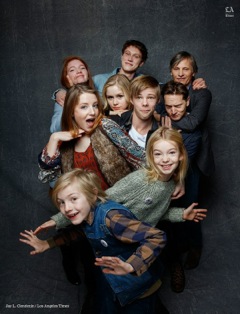

——————-
FABIÁN:
Acá hace un calor de los mil demonios, con mucha humedad y mosquitos. Acabo de terminar una columna para el diario donde escribo, y te la paso porque de alguna manera resume lo que me estuvo pasando en estos días de manera más o menos clara, creo. Por otra parte, si sale todo OK, nos vamos al campo cuatro días que son feriados. Hoy debuta el CASLA contra Patronato, y la semana que viene jugamos la Supercopa contra Boca -creo que este es un partido abierto para cualquiera de los dos). Te paso la columna:
En el camino de Gichin Funakoshi
Hoy en el diario vi la foto de Andrés D’Alessandro llorando en una conferencia de prensa. El tipo se iba del Inter –peleado con la dirigencia, según los periodistas- y volvía a River. No sé por qué cuando vi la foto pensé que Andrés lloraba por la emoción de volver a River, pero no era sólo eso: lloraba por lo mucho que quería al club brasileño y lamentaba tener que irse de esa manera. D’Alessandro lloraba por dejar un lugar y por volver a otro. Yo también lloré emocionado, el martes pasado, sentado en el vestuario del Onbu Dojo, por volver a hacer karate después de un largo año de ausencia. Digo hacer karate porque todavía no conseguí a pesar de diez años practicándolo y tener un cinturón alto, que el karate me haga a mí. Yo tengo que “hacer” karate, practicarlo, luchar contra él, para que me acepte. Soy un karateca outlet. Pero a pesar de eso, a pesar de no tener la menor habilidad para pisar el dojo con firmeza, el karate ya es parte de mí y simplemente no puedo dejar de practicarlo, despierto o dormido. Volví de las vacaciones con la convicción de que un error del año pasado fue no hacer karate. Es decir, argumentar que los sucesivos contratiempos de la vida cotidiana me impedían ir al dojo. No es verdad. Es autoindulgencia. Debería haber ido una vez por semana o una vez por mes, no tendría que haber dejado de ir. El karate, dice el sensei Gichin Funakoshi en sus consejos para practicarlo, es como el agua caliente, necesita estar siempre bajo la llama, grande o pequeña, si no se enfría. Muchas veces lo que no dice el consciente lo dice el inconsciente. Durante las vacaciones soñé repetidamente que estaba en el dojo del Sensei Mitsuo Inoue –con quien practiqué todo este tiempo- escuchando su voz, tratando de hacer uno de sus katas que son dificilísimos para mí en la vida real pero que son perfectos para soñarlos. Y me despertaba emocionado. ¿Seré un karateca perfecto, con kimé, que sueña que es un karateca outlet? ¿O al revés? La cosa, como bien dice Carl Jung, es que el inconsciente a veces se cuela en la vida real, modificándola. En las vacaciones estuvimos varios días en una casa que me prestó el genio Pedro Montes en Santiago de Chile. Pegada a la casa hay una librería, y en la vidriera se veía la cara anciana de Gichin Funakoshi en la portada de su libro Karate Do: mi camino. Increíble. Un libro que había buscado durante años, que parecía inhallable y del que sabía cosas porque me las contaban mis compañeros de dojo -estaba ahí, esperándome. Lo leí de un tirón y me acompañó en la cabeza y el espíritu hasta el día de hoy. “Cualquier lugar es un dojo”, dice Funakoshi, instándonos a practicar karate en todas partes y aplicar las enseñanzas del karate a cualquier cosa que hagamos en la vida cotidiana. “El karateca debe buscar la debilidad, no la fortaleza”, dice en un momento. Y aclara: “…esto tal vez no se entienda bien, pero a quienes practiquen con esmero y concentración, se les va a tornar claro”. Hay algo del karate do que viene de las enseñanzas chinas: no tener una meta o una táctica para encastrarla en la vida real como se unen dos piezas de rasti, sino que la estrategia vital consiste en que la acción naturalmente tome el camino apropiado. En el libro, Funakoshi habla de los maestros que lo formaron y de su vida como practicante y difusor del arte marcial. Se lee de manera amena y tiene en sus páginas cierta frescura mineral. Funakoshi también se ocupa de desmitificar las proezas de los karatecas: él es un karateka realista, y los trucos son para ‘Neo’ luchando contra ‘Matrix’, acá no hay superhombres que destrozan ladrillos ni tipos que vuelan por el aire. En el karate, el fin supremo es lo espiritual, sin eso las condiciones técnicas se vuelven irrelevantes. Funakoshi escribe también poesía: con sus caracteres que parecen pinturas, dice: “El penetrar en lo antiguo es comprender lo nuevo, lo viejo y lo nuevo es sólo cuestión de tiempo. En todos los casos el hombre debe tener una mentalidad clara. Esta es la vía: ¿quién la seguirá de forma correcta?”.
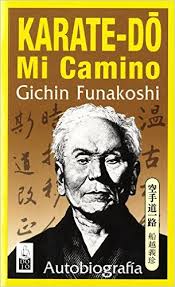
——————-
VIGGO:
Gracias, Fabián. Cuando te vuelva a ver me tenés que dejar ver ese libro del gran maestro japonés. Yo también estoy retomando, poco a poco, un viejo camino, el de la poesía diaria. No puedo dormir y escribí esto hace dos minutos:
Son las cinco
de este invierno nervioso
abro la ventana de la oficina
salgo en manga corta al balcón
hay mucho borracho en la plaza
será que es viernes por la mañana
pero también hay algo primaveral
esta noche de recién febrero
están sentados en el cemento
riéndose y rodando sus botellas
por la acera sin temblar
no entiendo esta brisa
o que el roble esté brotando
y los castaños también
es muy temprano para eso
y me hace temer el verano
que ya pinta largo y letal
todavía no leí los dos libros
que recibí el Día de Reyes
hago cuenta atrás y coloco
los laburos, amores, muertos
y desencuentros olvidados
en un orden que entiendo
para ver cómo va la cosa,
cuánto me queda de tiempo
y memoria para armarme
contra el muro implacable
cosas del amanecer solitario
rutina perdida que me sorprende
y me anima
como el subir a un pingo
después de tantos inviernos
pensando ¡qué maravilla,
cuánto lo extrañé! sé
que tendré que hacer siesta
por haber dormido tan poco
quizá sacaré a la perrita
antes de que pueda cagar
en la cocina.
——————-
FABIÁN:
Qué lindo poema, Viggo. Me hizo acordar a los poemas de Cesare Pavese, ¿los leíste? Tienen algo de ese discurrir cotidiano, empleado por un verso prosaico, que tiene el tuyo, aunque en otros ámbitos. Pavese escribe mucho sobre su pueblo, los campos, las colinas, y tu poema sucede, en parte, en el departamento de la casa. Por otra parte, me gustó el final tan sencillo y cómico que parece el de un haiku humorístico.
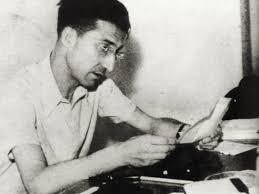
Regreso de Deola
Volveremos a la calle a mirar transeúntes
y también nosotros seremos transeúntes. Idearemos
cómo levantarnos temprano, deponiendo el disgusto
de la noche y salir con el paso de otros tiempos.
Le daremos en la cabeza al trabajo de otros tiempos.
Volveremos a fumar atolondradamente contra el vidrio,
allá abajo. Pero los ojos serán los mismos,
también el rostro y los gestos. Ese vano secreto
que se demora en el cuerpo y nos extravía la mirada
morirá lentamente en el ritmo de la sangre
donde todo se pierde.
Saldremos una mañana,
ya no tendremos casa, saldremos a la calle;
nos abandonará el disgusto nocturno;
temblaremos de soledad. Pero querremos estar solos.
Veremos los transeúntes con la sonrisa muerta
del derrotado, pero que no grita ni odia
pues sabe que desde tiempos remotos la suerte
-todo lo que ha sido y será- lo contiene la sangre,
el murmullo de la sangre. Bajaremos la frente,
solos, a media calle, a escuchar un eco
encerrado en la sangre. Y ese eco nunca vibrará.
Levantaremos los ojos, miraremos la calle.
-Cesare Pavese
(traducción de Carles José i Solsora)
——————-
VIGGO:
Sí, arrancó el nuevo torneo. Está hecho a medida para la Bosta, obviamente, con los dos grupitos -uno que incluye a River, Central, Independiente y San Lorenzo y el otro en el que está Boca. ¡Qué ladrones que son los Bosteros! ¡Cuánto miedo nos tienen a nosotros y a los Gallinas! Una vergüenza nuestros hijos, qué mal los criamos. Con el que todavía manda en la AFA, y el que ahora está desarmando todo lo positivo que se logró a nivel de gobierno federal durante la última década. Y no lo digo yo solito como Cuervo. Mirá esto que encontré recién en Olé, un comentario de un hincha de Boca Juniors con respecto al nuevo formato del torneo de Primera División:
“Matías Campos Hace 11 horas:
Como hincha de Boca, acabo de ver con que equipos están conformadas las zonas: ZONA 1 Riber, velez, san lorenzo, independiente, racing, central…. Nos sirvieron el campeonato (BOCA), tendrá que ver el presidente de la nación??? Ya siento asco del futbol argentino, Macri no gano todo con Boca, fueron los jugadores!!! Esos jugadores que veían como el Burro de Macri hacía negocios con sus pases, les robaba el 15% que le correspondia al jugador…”
¡Pavese! Es un honor que compares un poema mío con lo que escribía él. Hace mucho tiempo que no lo leía. Lo que recuerdo es que Scott Wannberg, un amigo poeta de California, me dijo una vez que Pavese era como un poeta norteamericano de alguna manera -que tenía algo de Walt Whitman y de William Carlos Williams, o de Hart Crane– y que se suicidó bastante joven (como Crane). Cuando después leí un libro de sus poemas traducidos del italiano original al inglés, me pareció que Scott tenía razón, que su estilo sencillo y directo -tan diferente al de sus contemporáneos italianos- era algo anglosajón/norteamericano.
Bueno, acabo de ver el partido que se jugó en Entre Ríos. Si no fuera por el Pipi hubiéramos perdido. Golazo de tiro libre, ¡gracias Capitán! San Lorenzo jugó mucho mejor en la segunda mitad, y Cauteruccio podría haber ganado el partido con un poco de suerte en los últimos minutos, pero no pudo ser. Típico para nosotros; a sufrir desde el vamos del campeonato. Pero un punto es un punto. ¡Aguante Ciclón!

Boca está empatando contra Temperley, sin goles. Quedan dos minutos. Si queda así va ser un gran triunfo para La Celeste. Como el empate contra nosotros lo fue para Patronato. Ya jugaron tres minutos adicionales. Siguen 0-0. ¿Cuántos minutos más les van a dar para que marquen los Bosteros? Cuatro, casi cinco… no lo puedo creer. Y se acabó, empate a cero. Bien. Nos vemos la semana que viene, hijos nuestros.
Él año pasado publicamos en Perceval Press un libro enorme de la poesía de Scott Wannberg. Creo que hablamos de él antes en esta columna, y de su muerte en 2011. La nueva antología de sus poemas, el tercer libro que hemos publicado de su poesía, se llama The Official Language of Yes. Me parece que te lo di en Buenos Aires cuando fui para ver el último partido de Bauza (contra Temeperley), ¿no? No recuerdo ahora. No estoy durmiendo bien estos días y, aunque la confusión que eso trae me sirve para “recibir” la poesía sin juzgarla tanto, no es muy bueno para recordar lo que pasó ayer y lo que tengo que hacer hoy. Sé que mi intención era llevarte el libro. Si no te lo di, decimelo y te lo traigo. No quiero enviarlo porque las aduanas son impredecibles, como vamos viendo. Este es el libro de Scott:
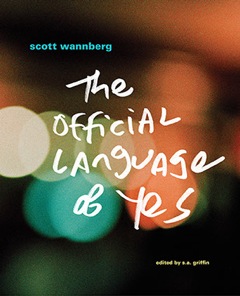
Hablando de Scott, te paso una nota escrita en el otoño (norteño) de 2011, cuando falleció Scott, por un escritor que lo conocía desde que eran pibes en Venice, California. Es una mirada especial de este singular poeta y amigo que extraño tanto:
RIPOSTE
by RIP RENSE

THE GREAT WANNBERG
9/08/11
“Chi son? Chi son? Son un poeta. Che cosa faccio? Scrivo! E come vivo? Vivo!” (“What am I? What am I? I’m a poet. What do I write?I write! And how do I live? I live!”)
—from “La Boheme,” by Giacomo Puccini.
Sound the general alarm. SOS. Lower the masts to half-flag. Call your mom and tell her you love her. Or that you don’t. The moon has retired, the sun says it was only kidding, songbirds can’t carry a tune. The thumb slipped out of the dike, the soufflé imploded, the zeppelin crashed. Oh, the manatee.
The Great Wannberg is dead.
Long live the Great Wannberg.
He went to take a little nap, apparently, but the nap took him. Or did he depart with deliberate grace? After all, he got up, dressed neatly, and then lay down on his bed and de-existed. Or had he dressed in order to go to the hospital because of dire symptoms, only to be waylaid by the Greatest Waylayer?
It hardly matters. He had been in “poor health,” as the cliche goes, for some time. Directly antithetical to his mental health, which is the way irony likes it. Or certainly that part of his mental health that was designed for creative thinking, analytical thinking, compassion, love, and poetry.
* * *
I met Scott Wannberg long before he was Scott Wannberg The Poet. To me, he was always just Wannberg, the wacky kid I knew in high school. Or that’s probably wrong. Maybe he was always Scott Wannberg The Poet. Even when we first became pals, on the Venice High School Oarsman back in 1969, he was declaiming in stream-of-consciousness, free-verse (and hilarious) fashion about various students, teachers, dogs, character actors, directors. . .
“There’s Bud Rotman (our advisor)! Bud Rotman, starring in ‘I Ate a Living Pumpkin,’ with Jeff Hillary, Lyndon Johnson, The Singer Midgets, and Rip Rense as Ygor! In this episode, dogs ride cosmic surfboards to Reseda, where they meet L.Q. Jones as Kemosabe, and organize mutants from Arcturus to rob liquor stores, directed by Sam Peckinpah. . .”
Or something like that (only better.) It was routine to hear Wannberg running his mouth, rapid-fire, low-toned, like a radio sports guy, at the desk right behind me, kids around him periodically falling apart, laughing. Or in some cases, squirming uncomfortably. There he was every day, generally in a striped T-shirt, a little bit too small, “regular boys’ haircut” mussed up, leaning forward, arms folded in front of him. Kind of a mutant Beaver Cleaver.
“Rin-Tin-Tin Meets the Wolfman, in which Maria Ouspenskaya takes Rip Rense to Tito’s Tacos. . .”
Who was this madman, we wondered? Was he funny, or a little nuts, or funny and a little nuts? Certainly we had never encountered anything like him before.
And never would again.
Wannberg, as I pretty much have always addressed him, became the film critic of the Oarsman. Not that there was any competition. Come to think of it, I don’t believe the job existed there before him. (And as I flog my arthritic old memory, I hazily remember having something to do with him getting the position.) Even then, the guy seemed to have massive, if not encyclopedic—almost savant—knowledge of films, their casts, their directors, their histories. Authors, as well. He went through books like Godzilla through fake Tokyo. . .
Thumbing through my old Oarsman compendium from ’69-’70, I see that Scott the critic reviewed things like “The Adventurers,” “Medium Cool,” “Planet of the Apes,” whatever was new and big. And, in one case, what was old and big: a special screening of the original “King Kong,” whom Wannberg wonderfully pronounced “the greatest actor that ever lived.” Of particular note is the fact that he critiqued a film that would impact him and his work throughout life, “The Wild Bunch.” Here is part of 17-year-old Scott’s appraisal, and by the way, it is doubtful that there were many other high school newspapers reviewing a film given an X-rating (mature adults) for violence:
“The Wild Bunch” is one of the most violent films ever made, but don’t let that stop you from going to see it. The violence must be there. If it wasn’t, it would be like pie a la mode without the ice cream on top. . .’The Wild Bunch,’ you see, is an allegory on the subject of violence. . .All the killing in the film is done in slow motion, which in my opinion, gives it a most creative appearance. The bodies fall like ballet dancers.
Apparently his run as a critic ended badly, though, when his “Adventurers” review was killed to make way for a tuxedo ad (well, it was graduation time.) Scott quit in a huff, and I interviewed him about it in the paper under the W.C. Fields pseudonym, Augustus Winterbottom. I think I slipped the article, “NOTED REVIEWER RESIGNS,” into the paper without the editor knowing. Declared Scott: “They cut stories to put tuxedo ads in, they think more of the ads than the stories. To hell with the ads.”
Spoken like a man destined to function outside commercial considerations!
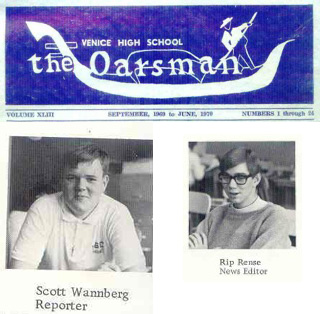
Of course, I took to Scott immediately, though I couldn’t have explained why at the time. I was quiet, depressed over “family” matters, and here was this madcap monologue a couple of feet behind me. Maybe he did it partly to cheer me up, I don’t know, but it was like having Monty Python in the back of your head, translating the world. Thinking back, I realize that there was something about Scott’s presence that just defied all bullshit. I am here, this is what I am, I’m not making a point of it, I just can’t help it—and I don’t mind. I was not aware that we both came from screwed-up homes, which was perhaps a subliminal bond between us. I considered myself a weirdo, an outsider, and recognized “my own kind.”
I mean, look. Any kid who would write full satirical scripts of westerns and slasher movies that starred all his high school friends—as his pal Curt Gibbs remembered in a note to me recently—and then read them aloud during “Nutrition,” well, that was okay by me.
But I must also point out that Scott was—then and always—an affable, grounded, empathetic person to whom anyone could talk about anything. The “wild man” aspect was a persona, a performance, and eventually an art. Our mutual friend, Bernie Beck, put it this way: “Scott and I had a pretty uncomplicated relationship via e-mail. No wild declamations, just pleasant exchanges, one decent chap to another. So the Scott I knew was a quiet, sensitive, sweet guy, though utterly perceptive about the world and people.”
We spent a year together, all told, on the Oarsman—I was news editor and Scott a reporter—and then he graduated. I never expected to see him again. We had been friends, colleagues, maybe some kind of kindred spirits, but nothing that would indicate a future of becoming lifelong chums.
“Rip Rense! Rip Rense!”
It was a good five years before I next saw him. I had wandered, rather depressed, into Martindale’s Books on the Santa Monica mall, one day-off from my job as a reporter on The Valley News. Feeling kind of lonely, disassociated, at loose ends. And. . .whoah. Wannberg! There he was, behind the counter. He’d changed. He was bigger, louder, more. . .Wannbergian. Seemed about eight feet tall. And was that English? And were those antennae with pinwheel eyeballs coming out of his head? Naturally, old Scott was talking at a crazy-fast clip to some customer, and I noted that his quick, darting eyes had acquired intensity that I didn’t remember from the Oarsman days. Yikes—he’s freaked out! I sort of cautiously went up to say hello, and, of course, that elicited the explosive, “Rip Rense! Rip Rense,” followed by about a twenty minute conversation outside, on his break.
He was smoking a cigarette, and I’ll never forget how he held the thing at arm’s length, between the first two fingers, pointed downward. Like it was radioactive. Then, every so often, in the middle of a compound sentence or unpunctuated paragraph, the arm would come sweeping around in a big elliptical motion, like a move out of Tai Chi, or a lazy octopus limb, and the cigarette would collide with his mouth—sssssssssst!—-then go back to arm’s length. Never interrupting a syllable of his stacatto—Scott-tatto—word parade. Well, it seemed that he gone to San Francisco State and majored in creative writing. Huh? You can major in creative writing? Why would you do that? Oh, to write poetry. Hmm. Ah, he’s a poet, eh? Hmm. Major in poetry, minor in cigarettes, beer, pot, acid? Poet? No wonder he was working nine to five in a bookstore.
Well, it was good to see him, and I think he said something about getting together for a flick sometime as I left. Me, I was not real sociable, never expected to run into him again (again), and figured the invitation had been courtesy. Chalked the encounter up to a pleasant accident, chance meeting with an old friend, something to lift my spirits on a lonely day off. But the fates, the Norns, the pixies, the gods of caprice and prank, had other things in mind. . .
Over the next couple of years, I just kept running into Wannberg. All over the place. Really. Now, how often do you run into someone you know in Los Angeles? Once in a great while, maybe. But repeatedly? Almost regularly? The odds of running into the same person over and over in different parts of this so-called city are as great as Americans breaking out in humility and grace. But. . .
There I was in Westwood one night, when thundering from behind, about 30 yards away, “Rip Rense! Hey, there’s Rip Rense! Star of ‘Son of I Married a Sun Demon,’ with Oliver Hardy and Marjorie Main!” Huh? I turned around. Wannberg, with a batch of pals. Headed for a movie, of course.
Hey, Wannberg, good to see you. . .
Six months later, at a Beatlefest at the Bonaventure Hotel:
“Rip Rense! Rip Rense! Cosmic boogiemeister of the great unknown!”
Hi, Wannberg, how the hell are you. . .
Six months later, in the Nuart Theater (or was it a UCLA screening? Or both?):
“Rip Rense, frogman of Alakazam!”
Uh. . .Scott, I keep running into you, don’t I. . .How’ve you been? What are you doing? Another bookstore, huh?
Another six months, or maybe a year:
“Rip Rense! Star of ‘The Last Lonely Rider.'”
And I swear this is true. I was at a Grateful Dead concert at Pauley Pavilion. At intermission, my somewhat exaggerated brain and I stood up, a bit, oh, overwhelmed by the atmosphere. How could there be so many deeply joyful people gathered in one place? And what, exactly, were they so deeply joyful about? I turned around, surveying the scene, and there across about seven rows of empty seats, blazing like a lighthouse, drenched in sweat, T-shirt stretched down around his knees. . .
“Rip Rense! Drawn into the irresistible Garcia night!”
Some things are coincidences you ignore. Like the woman you briefly dated who keeps showing up on aisle 13 at Ralphs. Some things are coincidences you don’t ignore, like your hair falling out when you eat wheat, and some are coincidences you can’t ignore. Like Scott Wannberg appearing over your shoulder ever six months. Well, I thought to myself, I guess I’m supposed to stay in touch with this guy. Okay, I get the point.
How patronizing and wrong I turned out to be. This ebullient human had been obviously and compassionately sent to me by the saints of circumstance to help cure my woes and save my id from slings and arrows of outrageous humans. Or try.
Wannberg! Court Jester from Betelgeuse! Socrates of Sunnybrook Farm!
So we not only stayed in touch, we hung out a bit. I don’t even remember how. Probably a lunch here and there, or certainly dropping by whatever bookstore employed him, to shoot the breeze on a break. Naturally, Scott scribbled out poems and handed them to me, as he did to countless others (masses of unpublished Wannberg poems out there, somewhere), and I found this mostly just amusing. Sure, I enjoyed the poems, respected his muse, but tended to chalk it all up to idiosyncratic, if always entertaining, Wannbergian élan.. I mean, this wasn’t Robinson Jeffers or A.E. Housman or Poe.
We also wrote letters back and forth, and getting a single-spaced typed (mechanical Olympic) Wannberg report was a welcome relief from the pressure cooker that was the L.A. Herald-Examiner in the early ’80’s. It was sort of like having that Monty Python narration again, skewering and burlesquing absurdity and inanity, as he had done when we were in high school. (Yes, I still have all the letters.) Then I had an idea. An inspiration, really. Although Scott only published chapbooks at the time, most courtesy of his great friend and champion, the poet S.A. Griffin, I managed to convince my editor at the Her-Ex that he was some kind of undiscovered L.A. poet genius worthy of a feature article.
Which I promptly wrote.
I felt nicely subversive in getting the boy into mainstream media print, much as I did whenever I managed to get Frank Zappa, Captain Beefheart, or someone like the great street musician, Bonggo Beane, into print. But the joke was mostly on me. Turned out I was unwittingly prescient and ahead of the curve in shining a light on Scott’s greatness.
where those rivers run
Sooner or later the music in your wounded heart
will work its way through the bones of ongoing hope
where the rivers run and the heat finds you in time
to prevent freezing.
The front door of my eyes open wide
and seeing can be believing.
The painted sky is a bit chipped
but latitude and longitude can still
tell time. Sooner or later the
dance in your wounded head will
find its rhythm where those rivers run
and all is vulnerable with love.
–Scott.
I saw him fairly often during the ’80s and after. There was a legendary (in my mind) trip to San Francisco for a run of Grateful Dead New Year’s Eve shows in ’83, which also included about a half-dozen other old associates, including fellow Her-Exer and distinguished reporter Andy Furillo, who has never forgotten the experience of meeting Scott on the plane ride. (Who could?) The little sojourn was a sort of mini psychedelic version of “Animal House.” First of all, there were about six guys sleeping in a single apartment inside an old Berkeley house borrowed from a friend, sacked out on floor and couches and wherever. The snoring was nuclear, notably by a guy named Mike Farkash (may he rest in peace), who had no business sharing a room with anyone outside of a wildebeest with a deviated septum. I can still hear Wannberg’s low, erupting laughter in the darkness as I yelled “Farkash! Stop snoring!” eventually taking to throwing shoes and books at him until he got up and went to a motel. Then came the New Year’s Eve show at the SF Civic Auditorium, an all-night affair (with The Band opening for the Dead) that found a certain reporter pal distributing little bits of funny paper with the explanation, “It’s really mild.” Right, we said, chewing it up. By the way, where’d you get it?
“Some old hippie with no teeth.”
Aieee.
Mild? Let me tell you my one indelible memory of Wannberg that evening. First, you must understand that when Scott danced his man-mountain physique around, it was a primal, free, full-body exposition that had nothing obviously to do with rhythm, or anything resembling conventional “moves.” It was a physical manifestation of the emotional and intellectual processes piqued by sight and sound before him. You probably know the Deadhead stereotype of hippie-dippie girlies “finger dancing,” doing rather comical little digital descriptions in air, as a sort of “vibe translation.” Well, that ain’t nothin’. Scott’s whole being was a finger-dance. Capped off by his pointing indexes, fastest digits in the west, shooting invisible Wannberg energy at lucky recipients, from up around the eyeballs. Lyrical, chirpy Garcia notes and eccentric Lesh bass runs algorithmed into his rhythm. Not one note escaped unused, not one note failed to inspire action. Wannberg was a living physical interpretation of sound, shimmying, waving, whirling Dervishing, his hands doing referee signals for a game of Moogoodoogoo on the planet Zunch.
So I was at one point glancing down on the roil of throbbing, percolating Deadhead ecstasy on the floor from my observer’s perch upstairs, when I noticed something peculiar. Yes, “peculiar” in this context might not carry much weight. But it was something out of the ordinary, given that the ordinary was entirely extraordinary.
A clear spot.
Right toward the rear of the floor, on the right side, in the thick of the impossibly happy exaltation of human larks, a clear spot.
Huh?
The crowd had automatically, instinctively, respectfully, and possibly a little fearfully, given the man room. There was a radius of fifteen empty feet all around Wannberg. The Deadheads had cleared it out, as if in the presence of royalty. I picked up my binoculars. Yes, many were watching Scott in a kind of frozen awe. Others were going about their own stylized maneuvers, aware of him without directly looking. Exchanging ectoplasmic electricities. They knew, either despite or because of their various chemical enhancements, that there was a holy man in their midst.
dance as if you believe it
some unknown country full of water
some hard to hear lingo
some shaky evidence of humanity
coming soon to your front door
dance it as if you mean it
they’ll be asking for you at intermission
when all will be revealed,
the invasion is getting a bit painful and gray
the monkeys are going over the exit strategy
a broken hemisphere just showed up for tea
i’d like to oblige everyone, but i forgot my number
could someone afford anything a la carte
some anointed asylum where the inmates
roll naked with God on an hourly basis
they never told me which God though
as the restless wages fell through the
holes in my pocket.
dance it as if you believe it
believe it as if you could dance to it.
—Scott.
Later that night, Scott magically appeared in the seat next to me, chuckling at the enormous rainbow moustache painted across my face, ear to ear. He was carrying on in sopping-sweat runaway train-of-consciousness reportage, and to my considerable shock, I realized that I was suddenly able to recognize the track on which the train ran, and read clearly the signs at every stop. Gadzooks. My brain had been rewired to speak Wannberg! I was so stunned at this, so dazzled by his discourse, his cosmic Chick Hearn commentary, so astonished by the the realization that Wannberg was speaking in deliberate, meaningful metaphor and keen analysis, that I began fumbling around with my wallet, looking for something to write on. I’m a reporter. . .got to write this down. . .important. This took no longer than several ages of man, as my hands were about the size of dump trucks. I mean, it was as if I could suddenly understand Japanese, with no instruction! At last, I managed to pull a business card from my wallet, and a pen from my pocket, and carefully printed one teency snippet of Ongoing Wannberg.
Here it is:
“A veritable sea of inevitable museums bobbing around down there.”
Inevitable museums.
Some people write poetry, for better or worse (usually worse.) Wannberg spoke it as a second language. Or a first. As one person observed after his passing, he had “no interior voice.” Because it was exterior. He blurted things like that museum line automatically, journalistically. He saw things for what they were, in cosmic context, and interpreted them wildly, pithily, heartfully. Usually with a kind of wry wink, implied or stated, if not uproarious flight of free-associative fancy. Even in his saddest and most sober utterances, there are amusing references and striking amalgams of words. The wit and amusement of those high school monologues never left him.
But back to that New Year’s Eve. I suppose some might say that LSD and Wannberg was a redundancy. I’d say it was more like a shot of espresso. It stoked his id, fired up the metaphor blender something fierce. Problem was, it didn’t quit. While my nerves required a few days of quiet after that New Year’s Eve, Scott was rolling, rapping pretty non-stop—the flights were still fancy—a couple days afterward. I recall wandering around Berkeley with my cronies, Wannberg kind of trailing a few feet behind, rat-a-tatting congenially, crazily, Wannbergially. My brain was divided between amusement at one friend’s extreme irritation with Scott’s inability to remain quiet, and delighting in. . .Scott’s inability to remain quiet. Plus I was still easily parsing his verbal Jackson Pollacking, his whirligig word wiggling. In the end, though, I scrapped plans to spend six hours with him on I-5, and bought him a plane ticket home. Not sure, even now, that this was the right decision.
no time to be scared because everything is just weird riff
the maitre’d turns into Sandra Dee
and the airport is full of frogs with fine English accents
must of been something i partook in
must be the way things roll now
Doctor of some specialized part of the so called body
comes through my window
has a secret plan to save everyone
i can’t read it very well, it’s written in some kind of
mystery that nobody has published a way to solve
Tonto and the Lone Ranger are waiting for me to finish this poem
they want me to ride out with them to Love Corral
their hearts are tired of doing good deeds
their hearts are breaking slow
I take them to the jazz river
the one you sang to me just now
i take them hopscotching
across a gin martini ocean
Every day here is Jack Elam
Could you hum a few bars right alongside me
The laser beam keeps missing us
Could be the house rules
Can’t find the keys to climb back through
Take us all then to jazz river
the one that sings to me somehow
No Time to be Scared
weird judges make eerie jurisprudence
so what
no jail can smoke me
i’d go down raspy with promise
No disputin
Mr.Rasputin
blood in the mouthpiece of the horn he’s tootin
blood and human
rolling in the dust
by the quiet crying water
by the everloving everlasting
no time to be scared
put your thin hand in mine
put your thin dime in time
don’t bother betting
let your heart do the pumping
by the lack of a vocation water
by the altogether whatever
no time to be scared
here comes rain maybe
walk with me
i ain’t bullet proof
but i will always try to give you a good time
—Scott
Well, there would be parties in my Sherman Oaks apartment, where Scott happily chowed down on my then-wife’s great Chinese banquet cooking, and where he once did the Wannberg finger-pointing conducting/Intergalactic referee hand-signal thing in the direction of a spectacularly top-heavy belly dancer spinning around my tiny living room in celebration of the 70th birthday of old journalism colleague Carter Barber. I was a bit worried that the dancer might not take Scott’s gestures in the intended spirit, but no worries. He always radiated good will, despite the “conducting.” And oh my, how to describe it? Leopold Stokowski as animated by Tex Avery. Scott’s eyes went Lugosi, or maybe Renfield, and his hair went stringy with rivulets of sweat, and he pointed and jabbed and waved and whooshed his arms, as if manipulating giant invisible marionette strings, hands and fingers seeming to extend right from his forehead. Wannberg String Theory. He always did this when there was music. He connected with it, inhabited it, became molecularly involved with it. If you didn’t know him, yes, this could be a bit, oh, alarming. If you did know him, it was a beautiful, manic pantomime. He should have been a character in Alice in Wonderland.
Scott also used to come around—I guess I drove him, as he never drove a car in his life, far as I know—when my dear friend, Joe Shinn, took out his electric guitar and was kind enough to pretend that I knew how to play drums. We jammed countless times in Joe’s Granada Hills house or garage through the years, usually with the redoubtable keyboard improvisations of our third perpetual member, the venerable music critic Richard Ginell. Scott would read his poems, or launch a verbal improv, and we would jam. I tell you, those collaborations should have been witnessed outside of those confines. Ginell recalls a snapshot: “I’ll never forget it. Reagan had said there is no hunger in America. Scott was at the microphone, while we played, holy-rolling ‘No hunger in America! No hunger in America! Then why is this guy biting my leg!'”
Joe Shinn, I should explain, is another singular “old soul” (there really should be a better term for these people) who in his way was as incandescent as Scott. I was curious as to how the two might get along, or if they would get along, what if any rapport there would be—a curiosity that was satisfied the very second that Scott entered Joe’s home for the first time. Consider: I’d once seen Joe, without warning, approach a woman at a party in his house and say, “I want you to leave my home. Now.” (She did.) He just simply objected to her presence inside his sanctuary. But Joe’s understanding of Wannberg was instant, and total. I discerned merely by the courtliness of Joe’s body language, as he stepped aside to welcome Scott, that he had understood himself to be in the presence of unique light.
joe shinn said go out and sing
joe shinn he kissed the world
and his kiss made the world somehow human
joe shinn said go out and let the world sing you
joe joe joe shinn
father of the moment
creation’s own only child
joe shinn’s fingertips
how the Earth tapdances on them
your heart is a language
your heart is where wounded birds land
and rebuild their
empathy
—Scott
And there was more to the Wannbergian aspect of my musical “career.” I was in a band for a few months with a kind woman named Joanne Nilan (rest in peace), and woe to us all that she passed away not long afterward from leukemia, for aside from her generous heart, Joanne adroitly adapted Scott’s poems as melodic, original, even (dare I say it) catchy songs. Really. Imagine Wannberg with melody. A potent notion! Well the band was The Cassettes, a name I would have changed at least to something like “Night Train to Yo Mama,” and I played in only one performance: at BeBop Records in beautiful downtown Reseda on a Saturday night. I’m convinced that these pop tune adaptations of Wannberg would have been critically acclaimed, had anyone with half a reputation ever managed to record them. “War is Our Only Bank” and a dozen other tunes would have made one hell of an album. Might have out-Oingoed Boingo. And yes, Scott sang and ranted on a “Scott’s Blues” jam that night. For me, it was glorious. To help musically embellish parts of the Great Wannberg Poem—what a prank! I got so caught up in the night that I threw the straight-laced guitarist and bass player for a loop (they never understood Scott, or the songs) with a minor solo, and, to my considerable surprise (and theirs), I finished the raucous, high-speed encore right on the money. . .
. . .reach now into your shoulder holster of some mighty fine times
and make me a bullet that will last
down on the corner of Good Luck and I Mean It. . .
—Scott, from “Mighty Fine Times.”
A few years later, in the early ’90’s, I wrote yet another piece on Scott The Poet, this one for the L.A. Times, and once again felt that I had done something subversive. Editors, you see, were often suspicious of my story ideas, often felt I had an ulterior motive (which I sometimes did.) Yes, I did the “full disclosure” of telling my sagacious, learned Times editor (cough) that Scott was a friend, gambling that the self-serious Times would not regard this as “conflict of interest.” I suspect the story was approved only because by that time, Scott had become a sort of legendary fixture at the great reader’s bookstore, Dutton’s, in Brentwood, recommending literature to everyone from Randy Newman to T.C. Boyle to Patrick McGoohan. (He always said goodbye to McGoohan with the wry farewell from “The Prisoner,” “Be seeing you.” McGoohan provided the appropriate rejoinder, “And you.”) Translation: even my editor had heard of the weird big guy who knows every book in the store. He’s an L.A. character.
I had hoped the article—which I made as lively as I thought I could get away with in the Times—might prompt more articles, interviews, profiles, mainstream media that would lead to breakout recognition of Scott and his work, but no. That didn’t happen until he died, of course.
During the late 90’s and up until two years ago, I picked up Scott every year, shortly after the New Year, and drove out to KPFK in Studio City, where we and S. A. Griffin joined the redoubtable Barry “Mister” Smolin’s “The Music Never Stops” program for what Barry came to call the “annual freakfest.” There were poems for the new year from all of us, or at least from Scott, S.A., and the mysterious poet Raj Bavnani, who always showed up late but redeemed himself with some very affecting recitation (greatly amusing Scott and S.A., and even me.) Mostly, it was just an excuse for all of us to have something that I vaguely remember, something that used to happen often on radio, something that is fading now as I age and lose more and more friends to the Reaper, something that I believe used to be called. . .uh. . .oh yeah—
Fun.

Year after year, Scott parked his bulk behind a KPFK mike, a merry-eyed Kong with the ever-ready giggle of the Maharishi Mahesh Yogi and the explosive guffaw of Ed McMahon, throwing in his instant-script inventions of psychedelic science-fiction cowboy musicals, reading stirring paeans to love and sanity, denouncing the martinets of the moment. It’s a funny thing—and this might say more about Scott than it says about me—but every time I looked at the guy, it was always the same Rip & Scott from Venice High. It was never Scott the Poet or Scott the L.A. character and Rip the journalist/writer. I could shoot him looks and manage to squeeze a quick reference to Dwight Frye or Max Baer Jr. into the deranged, super-speed give-and-take between he and S.A. at the studio, and Scott would just crack up. Exactly as he did in high school. Which, of course, made me crack up. . .
Beautiful thing, friendship.
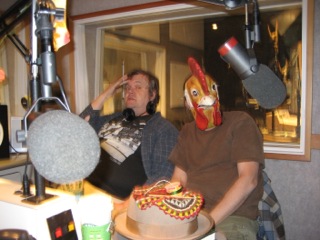
The other day, I happened to look at Scott’s senior photo from the Venice High annual, posted on Facebook by his loving older brother, Bob. It was a shock. There was the young proto-Scott, fresh-faced, bright-eyed, burning with intelligence, expectation—a Scott that I had forgotten. It made me cry. I couldn’t help but compare it to the Wannberg of recent years, massive, hulking, oxygen tubes in his nose, shuffling, borderline crippled. How to reconcile the two images? Then it hit me. No need. When Wannberg spoke, whether at 58 or 16, it would be:
“Rip Rense! Rip Rense! The kettles are singing elixirs of ecstasy, tomorrow found its middle name, and meercats and mere dogs are flying! Rip Rense!”
Or something like that (only better.)
You see, when Wannberg met you, he celebrated you. It was no put-on, it was delight. He delighted in you, and let me tell you, there aren’t too many people who delight in me. But Scott did, as he did most everyone, leaving most everyone feeling somewhere between worthwhile and embarrassed. Was it a de facto compensation for a life spent unmarried, without a solid female relationship? He didn’t love just one, so he loved all? Perhaps in part. However he came to terms with that sorrow, he came to terms with it. He loved all, by his very nature. Hell, maybe that prevented him from settling on just one.
As to how or why Scott delighted in people, delighted in books, delighted in movies, delighted in dogs and cats, delighted in butterflies, delighted in delight, speaks to the heroic essence of his being. Yes, heroic. For it must be noted that Scott was fooled by no one and nothing, nada, no way. He had detailed knowledge of history (his reading tastes were those of a Renaissance man), prodigious powers of analysis, and was anything but blind to the chicanery and evil of human beings.You could sit and discuss World War II or the Civil War with him and never imagine that Scott the Poet existed. If anything, man’s inhumanity to man hit him very hard, and drove him to drink—I mean, think. But the point about heroic is that Scott carried his share, or more, of heartbreak, pain, anguish. Perhaps he would not agree, as he was not given to bemoaning his fate, but that’s how I see it. He had a great ride, yes, but the road was pitted, mined, with dangerous curves and unmarked detours.
I know nothing about his childhood. There was a divorce, and he wound up spending decades living in a small one-bedroom apartment in Mar Vista with his gentle one-time engineer father, Ernie, who did the cooking, crossword, and slept on the crummy living room couch. Eventually, Scott nursed his pop through a long and wretched period of terminal cancer, at home, with all the grim and grotesque duties that could entail. When Ernie died, it was Scott’s devoted friend, Doug Dutton of Dutton’s books, who helped him to manage a small inheritance well enough to facilitate purchase of a clean well-lighted converted-apartment condo in West Los Angeles. But Scott’s mother also died during the same period, and his beloved de facto cat, Bob, was run over by a car. It all proved overwhelming, a devastating time that left friends worried for Scott’s emotional recovery. It ultimately took a “ritual shower” to cleanse his spirit—arranged by S.A. and others (really)—to bring the man out of his grief.
Oh, about Bob the Cat. The orange tabby had years before adopted Scott and Ernie, spending most of his time with them while his official and understanding owner lived upstairs. Whenever I would drop by, it was common to see Scott sitting on the porch, or stairs, talking to Bob in a way that indicated respect for Bob’s being. And I swear that Bob seemed to understand this. Well, Scott agonized about whether to take Bob to his new condo digs because he felt it would be unfair to make him into an indoor creature. When Bob was killed shortly afterward, Scott felt terrible guilt, convinced that the cat had gone looking for him when he was run over. Of course, he wrote a poem about it.
i would talk to you as if you understood what i said
perhaps you did,maybe not all of it,but some of it. . .
it will hurt my ears that lack of a meow
but i know you are singing wherever you are
now. . .
from “For Bob The Cat, My Friend.”
And this is as good a time as any to say that no dog or cat has had a more sympathetic friend than Scott Wannberg. As with “Doc” in Steinbeck’s Cannery Row, I swear the dogs smiled at him. As has now become lore, Scott kept a box of dog biscuits behind the counter at Dutton’s for any canines who accompanied bookworm humans into the joint. Think he could have gotten away with that at Borders? I see him now, in the Dutton’s courtyard, bent at the waist, talking gently to golden retrievers and mutts, dispensing yummies.
In time, one Dixie the elderly cat was left in Scott’s permanent care, and while he was happy about this, and finally happy to have his very own poster-and-photo-plastered pad (which was about a mile away from my place), things were not destined to stay that way.
I think it was no more than two years into his new life that a viral infection robbed him of his ability to sleep. Pfft. Gone.
The mechanism was broken, Sandman assassinated. Month after month, he managed only the most fitful, light naps in an easy chair, and it made him nothing less than wing-ding, dithering, ringaroundtherosy. . .crazy. Doctors who knew nothing of the beat Falstaff Wannberg personality took one look at the guy, raised eyebrows patronizingly, and sent him right to shrinks, who, knowing nothing of the beat Falstaff Wannberg personality, took one look at him, raised eyebrows patronizingly, and put him right on drugs. Five drugs, at one point, for sleep, anxiety, depression, psychosis, and possibly dandruff. Depressed? Wouldn’t you be if you couldn’t sleep? Psychotic? A Nurse Ratchet diagnosis. The drugs vied for control of the alternating stupor and raving chaos suddenly competing in his brilliant head. The “mad genius,” at this time, went mad. As Griffin said, “We thought we’d lost him.”
It culminated with a catastrophic episode of Ambien-induced sleepwalking, in which Scott woke up one morning with a badly broken foot, and no recollection of how it happened. A doctor recommended surgery, and Scott generally did whatever doctors told him to do, so the appointment was made—despite friends, notably Griffin, counseling against it. Surgery to implant pins led to a pernicious staph infection, which led to the devil, Inactivity, which redoubled all the anxiety and chaos, which manifested in monstrous compulsive eating, which added over 100 pounds to his already heavy, six-feet-three-inch frame. And somewhere in all this, there were repeated (probably unnecessary) prostate biopsies and some quack who told him he had “a little cancer,” but that it was nothing to worry about. Huh? I’ll leave out the parts about “friends” who took advantage of Scott’s generosity and crashed in his home for weeks, months. . .
The leave of absence from Scott’s beloved Dutton’s stretched on endlessly, financial worries became obsessive, insurance struggles went unresolved, and the staph and mega-antibiotics wouldn’t quit. One day he found himself sentenced to a Santa Monica “convalescent hospital” (one of the greatest of oxymorons) among roommates who were mostly babbling, raving, drooling animated corpses. I try to avoid the desiccated word, “incredible,” but this really was.
Worst of all, for the only time that I know of in his life, Scott’s poetry died.
Gone was the lyricism, metaphor, wild rapids of free-association, quips, word-plays, impish rhymes, coded commentary, weighty insights, and in their place, a sort of leaden, prosaic recitation of his ills. He stopped writing entirely for a while, or when encouraged to try, could only manage more uninspired stuff about his ailments, organized to resemble free verse.
Again, friends sighed that he was lost.
I suspected differently. To me, Scott was an intrinsically strong, pragmatic guy, behind the poetry, behind the performer. I always regarded him this way, eccentricities or not. He went to college, he held down jobs, he had a world of friends, he thought clearly, he diligently paid his bills. He was nothing if not totally plugged into current events, in depth, at all times. I thought his “recitation of ills” passing for poetry was an attempt to deal with reality. I figured the guy was doing what he needed to do, somehow, and would eventually sort out all the trouble, get off the stupid drugs (as S.A. and I incessantly implored), etc. Hell, you’d go to visit him at the House of Drool, and it was still, “Rip Rense! Rip Rense!” The ever-celebrative greeting. He’d be in a wheelchair, with his damn bandaged foot refusing to heal, devouring an old episode of “The Rifleman,” noting importantly that it was directed by Peckinpah, while in the next room, the barely recognizable remains of an old fat woman raged and roared profanities in a Satanic death-metal baritone as she thrashed from side to side, naked, strapped to her bed. (In an incident somewhere between the Marx Brothers and David Lynch, this same creature stole and began wearing one of Scott’s Grateful Dead T-shirts, which annoyed the hell out of him.)
Perky atmosphere!
I’ll never, never forget the time I found him in the dining room of that urine-stinking fluorescent-light Bedlam, surrounded by ashen, staring, slack-jawed Alzheimer’s cases. There he was, smack in the middle of them at a long table, like some great Norse giant, knife and fork in hand, waiting expectantly for dinner to be served, while the TV was showing “The Golden Girls” or some rot. The poor guy looked happy—because somebody was cooking for him! I would have cried had it not been so damn funny. Scott’s grip on the whole matter was realistic. He spoke of healing and going home and going back to work, in between laughing about how his paraplegic Iranian roommate used to sneak out the window at night to visit hookers.
we’re just the mud of a spoiled petulant god,
hanging out in the playpen,
making up rules,stories,and visions
we’re just the sacred mud of love
listening for the rain
—Scott, “Listen to the Rain.”
If these sad things that went on in Scott’s life arouse pity, I think they should. But the point I am getting to here is that they never aroused self-pity in Scott, at least not that I ever witnessed. No, the Wannberg psyche was too worthy a contraption, fundamentally a machinery of joy, to paraphrase Ray Bradbury, an improbable Rube Goldberg amalgam of brain-junctions and neurons that always eventually filtered out hardship, ugliness, tragedy, the misdeeds and foibles of humans, and personal suffering. It’s in his poems, which are nothing if not resolute in their campaign for people to “smell the nice coffee breeze going by in that unilateral moment of music that we are all made of.” Somehow, in the end, Scott was buoyant, mirthful, optimistic, or trying to be. No monkey wrenches ever fouled those works. He came back from all these health horrors and lived to write his rocket fuel poetry another day. That’s right, the muse came back, in full force and more, yielding what I think was greater work than ever (still maturing right up to the end.)
And The Great Wannberg at last returned to Dutton’s.
How you get up in the early hours
tells me a lot about your dancing ability.
They claim the highway has no best friend.
Someone bailed it out of jail, though, last night.
We sat and drank beer and watched the meteors fall.
I got an earful of sun and had to wash my ears out afterward.
Maybe the resurrection will show up as promised and give us
something to sing about.
Maybe it won’t.
I intend to sing anyway.
When you finish reciting all the pain,
when the dog finally digs up his last bone,
come on over and put the bulletproof vest down.
Everybody says they want to be loved.
They say it over and over and over.
As soon as they finish hitting me over the head,
I will get up and love them.
—Scott, from one of his late poems, “Earful of Sun.”
But he’d changed. There was a limp and a dragged leg added to his Frankensteinian shuffle, a protean gut that wouldn’t leave, and a lifetime of smoking that was beginning to catch up in a very nasty way. He was diagnosed with that generalized acronym, CPOD, chronic pulmonary obstructive disorder, which essentially boils down to emphysema. Still, Scott was indeed back at Dutton’s, back from the convalescent hospital, back from five drugs he didn’t need, back from sleeplessness (who knows why), back from madness. Part-time at first, breathing heavily, but in time Wannberging around as always, essentially telling people what books they needed to read, whether they asked or not (and as most attested after Scott’s passing, with uncanny insight.) And more than ever, his devoted, important, cherished friends, casual or otherwise, continued to come through: Dutton, with very liberal accommodating of Scott’s health difficulties. . .Griffin, with another chapbook or tour with the Carma Bums, the now famed cadre of poets who fishtailed around the country in an Griffin’s old Caddy, reading in coffeehouse after coffeehouse. . .Actor Viggo Mortensen, another great champion of Scott’s, with Scott’s first real honest-to-dog hardback volume of Scott poems, Strange Movie Full of Death (and a brand new one, the fatefully named Tomorrow is Another Song, due Sept. 30) . .Actor Ed Harris, with a genuine fat role as a bartender in a western he was producing and directing. . .
Yes, Wannberg the actor! He’d had a bit part that wound up in the extra features of “I (heart) Huckabee’s), but now he would join the ranks of his long-admired L.Q. Jones and Strother Martin (whom he had once spent an afternoon with, while in high school) and become a genuine. . .character actor. A bonafide inhabitant of movies, things that he had vigorously, if metaphorically, inhabited all his life. It must have been like going through the looking glass for him, the idea of being on screen instead of watching one, yet he was up for it big-time, with total aplomb. He learned his bartender lines and headed off to Arizona for the shoot, and I figured it was just a matter of months before Wannberg became wildly in-demand in Hollywood. Seriously.
Well, timing is everything.
While at the shoot, Scott’s lungs gave out and he was carted away in an ambulance.
Those who knew him, who read his obits a few years later, who listened to or read his own running reports of his life, know the rest. As the United States continued its ritual purge of intelligence, individuality, integrity, in favor of any-damn-mediocre-stinking thing-that-will-turn-a-profit, Dutton’s died. Some creepy billionaire is planning to tear down three or four buildings and put up another “mixed use” greed-palace—just what L.A. needs.
And Wannberg? Well, he was a butterfly with its wings pulled off.
No more bookstores? Might as well have said no more newspapers. Oh, right, that’s practically happened, as well. But what would a guy like Scott do, a guy who had supported himself for a lifetime by making himself indispensible to readers? A guy for whom books were churches? He couldn’t very well prowl the aisles and stock the stacks at Amazon.com. No McGoohan there, no Peter Case, no precocious, reserved high school kid wondering what to read. What to do? I can’t imagine how he must have felt, and our conversations on the subject were sort of resigned and perfunctory.
Somehow—through combined efforts of S.A., Dutton, and Scott’s uncle, Ken Wannberg (the famed film music editor)—it was arranged for the Scott the by-popular-acclaim L.A. Poet Laureate to become an anonymous strange person in the tiny town of Florence, Oregon, where he would. . .do exactly what? Oregon? Where was that? What was that? Wannberg breathed in L.A., and breathed out poetry. L.A. was the northwest corner of Wannberg and Existence. Movie Central! Scott without movie theaters and bookstores and freeways was like Bob the Cat without. . .Scott.
It was Griffin who eased his worries and literally packed him up and drove him north. I had a bad back, and a bad brain that didn’t want to witness Scott having to leave town, so I stayed away. I wasn’t the greatest friend, that way. Then came the regular Scott phone calls and e-mail, with considerable talk of how down he was, and wondering what to do with all those trees and blue skies and rain. Everyone encouraged him, of course. Invaluable to Scott, as he told me, were lengthy daily phone conversations with his brother, Bob, in Nevada. Seems they discussed a lot of “family stuff,” which seemed to hearten and comfort both brothers. I chipped in with undoubtedly impotent and obnoxious and lengthy pep talks about how great it would be to live close to nature, for a change, and the health benefits of. . .air. . .on his tar-pit lungs. As opposed to the particulate McDonald’s-encrusted gas we inhale in Southern California.
“Walk!”
“Huh? Walk?”
“Walk!”
“Whaddya mean, ‘walk!'”
“Get out and walk, Wannberg!”
I exhorted him regularly to move his bones, to pick up his oxygen tank and get around. Walk a quarter mile, work up to a half, work up to a mile, and so on. Walk, walk, walk.
“Where?”
“Where? Where? Oregon!”
I no longer can keep the chronology straight. I just know that over the months, years, he made a—here comes that word, heroic, again—effort to lose weight, and the pounds dropped off. Well, some of them.
“I’m up to 50 laps now. . .”
“Laps? Around what?”
“The parking lot across the street.”
“You’ve got the forests and meadows of Oregon around you, and you’re walking in a goddamn parking lot?”
“Yeah, well, it’s good for laps.”
True enough.
Now that’s some kind of determination. Walking dreary laps around a dreary parking lot towing or carrying a dreary oxygen tank every dreary damn day. But he did it, did Scott. Rain and shine. And he stuck with it.
I think he wound up dropping about 70 pounds.
Maybe it bought him a little time, but really, it was too late. His lungs were semi-retired, not much interested in breathing even as a hobby. There would be a couple of hospitalizations, one in which copious amounts of black gunk were somehow pumped and sucked out. (Don’t smoke, kiddies!) Everyone knew his goose was cooked. The only question was how long before it had to be taken out of the oven. I hoped he might make it into his early or mid-60’s.
Which brings me to Facebook, or as I prefer, Farcebook. I despise the thing. I think it preys, feasts, gorges itself on loneliness and alienation, and is a circus of misunderstanding and misinterpretation. It pretends to conversation, when typed conversation is neither writing nor speaking, and lacks intonation, raised eyebrows, sniffs, grunts. What’s more, I don’t think we were ever meant to be in touch with every person we have ever known everywhere in our entire lives at all times. Know what I mean? On my “friends” list are people I knew 40 years ago, and people I don’t know at all. It’s nuts, and it has made a feral little twit into a billionaire. Worst of all, I’m addicted to it. It offers the illusion of company, which is a balm for those of us who work at home. Or work with cats. Still, I curse it and wish I could quit. Except for one thing. . .
Wannberg. Farcebook saved him. It’s that simple. Scott loved to write, and to type, and talk, and suddenly he could write, type, and talk to. . .tons of people. All. The. Time. Three a.m., three p.m., three to get ready, four to go. If you are thinking this is akin to giving a lifetime supply of Dilaudid to William Burroughs, a mirror to Oprah Winfrey, an iPhone to a 12-year-old girl, you’d be about right. Except in this case, it was good for him. Before long, Scott had thousands of “friends” and ultimately became, as his longtime friend and fellow poet, David Smith, put it, sort of the “John Lennon of Facebook.” He posted, and posted, and when he wasn’t posting, he posted some more. Articles, comments, gibberish, fake movie casts and plots, poems, poems, poems, advice, comfort, care, instruction, inspiration. The fake names he came up with for characters in imaginary movies had me daily guffawing into my computer screen. Intestinal Fortescue. And it seems he was not only writing to, but as Griffin revealed, guiding (the popular term is “mentoring”) hundreds of poets all over the world, mostly young and aspiring. As well as comforting people he’d never met through the deaths of friends, pets, parents, offering counsel and advice to some who had lost jobs, wives, self-esteem, ambition, hope.
Scott who never had a wife and family suddenly became Papa Wannberg the Sage of Facebook. Beautiful!
Happiness returned, and after a couple of years of prowling around and indoctrinating locals with Wannbergism, Scott also, not surprisingly, became the toast of the beat intelligentsia and regular folks in Florence, Oregon. Of course he did. He’d have made friends in solitary confinement. He came to be known and loved in local diners, at the local cinema, at various coffee houses where he resumed giving readings, his mildly elevated and excited recitation voice intact despite the oxygen tubes in his nostrils. Florencians realized, to their credit, that they had a poet laureate in their midst, or maybe a lorried poeat. Those who didn’t know what to make of his marauding intelligence and intense presence were soon beguiled by the innate innocence and kindness that he gave off the way Krishna gave off a blue glow. I think back to the Deadheads at that New Year’s Eve show, giving him wide berth. They realized there was a holy man in their midst.
Best of all, as far as I’m concerned, his poetry got even better, deeper, more refined.
One Day Summer Rented a Room
Hard laughter in a can, a bright can, aisle 56,
endurable can, endurable bright hard laughing can.
Can I, would I, should we, hard hard hard laughter in the land,
cool front moving in on
cool front moving
sad coffee hallelujah.
Man stumbles up alongside me.
Man says can I sing him some everlasting everloving?
Says me, yeah I can, and commence to let it all fly.
Cool cool front hanging in the back,
easy sorrow in a can, a bright can, aisle 58
endurable can, endurable easy sorrow can.
One day summer rented a room.
I fit into it.
—Scott.
And I’m going to leave off here with that happy aspect of his late life, except to say that his ending was apparently merciful. Scott the ancient teenager seems to have laid down on his bed and gone to sleep, followed not long afterward by his overtaxed old heart. He was, it seems important to say, afforded one of the “Three Things are Needed” that he once expressed in this 1982 poem:
three things are needed.
a space big enough to die in privacy
someone’s phone number other than my own
the feeling that no matter how many muscles i make
i remain
vulnerable.
When I think of Wannberg now, it is with an oppressive sadness. Yes, he left a lot of himself behind, and with so many—the inevitable museum realized. The tributes, obituaries in major newspapers and network television, recognition of his greatness, and broken-heartedness of his friends—Facebook or life-long—have amazed to all who knew him. Scott would have loved it, sure as Bob the Cat loved to have his chin scratched. I can imagine him sitting back, arms folded across his chest, eyes half-closed, nodding, letting out a contented, “Mmmm.” Hell, perhaps there will be a Wannberg Exhibition, a Wannberg biography, a Wannberg movie, a Wannberg Happiness Festival.
But his ambling bulk will never again show up behind me on a street in Westwood, or leave a raucous, rambling message on my answering machine, and I will never again hear his Walter Winchell-esque bark celebrating my presence with an outburst of “Rip Rense! Rip Rense! Friend of the Lost Dogs of Neptune!” As I think about old Scott, I am reminded of my wife’s old cat, B.C. (whom Scott knew.) And how when B.C. died at age 19, I realized that all those years that I thought I had been taking care of him, it really was the other way around. He had been taking care of me.
I think this is true of the great Scott David Wannberg of Los Angeles, Florence, and The Nice Coffee Breeze Going By In That Unilateral Moment of Music, and all who were lucky enough to know his garrulous, giving, joyous, hulking, riffing, analyzing, dancing, singing, celebrating, delighting, scribbling, typing, declaiming ongoing self.
Salud!
